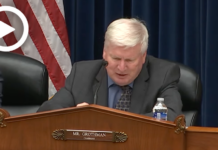This week, the U.S. Supreme Court issued an emergency order allowing Idaho to enforce its statewide ban on harmful puberty blockers, hormone treatments, and irreversible mutilating surgeries for minors. With Chief Justice John Roberts abstaining from any opinion, the High Court ruled 5-3 to largely vacate a lower court’s decision to fully block Idaho’s law. However, the High Court allowed puberty blockers and hormone treatments to continue for the two anonymous teenagers whose families sued to block the law.
In 2023, Idaho enacted the “Vulnerable Child Protection Act,” which criminalizes the act of mutilating children through “gender-related procedures” as a felony. According to the law’s text, violators can face substantial prison time for a term “of not more than life.” While the law was set to take effect January 1, 2024, a federal district court temporarily blocked it citing the law “likely” violates parents’ equal protection and due process rights under the 14th Amendment. U.S. District Court Judge B. Lynn Winmill ruled that parents have the right to seek “specific medical treatment” and approve “gender procedures” for their children. The Ninth Circuit Court of Appeals declined Idaho’s appeal and kept the law from being enforced.
While the case regarding the two families is still under litigation in the lower courts to determine a permanent decision, Idaho’s attorney general filed an emergency request with the Supreme Court claiming the injunction was too broad asking it to be limited to just the two plaintiffs seeking access to drugs. Idaho is seeking to enforce the law statewide in all other circumstances.
Justice Neil Gorsuch, who authored on of the High Court’s majority opinions, sided with Idaho and stated the district court chose to impose a “universal injunction” that prevented the state from enforcing all aspects of the law instead of a “narrower” injunction that just allowed access to the drugs the two plaintiffs sought. He noted that mutilating surgeries were not at issue in the case and questioned the need to block the entire law.
“In this case…the district court went much further, prohibiting a State from enforcing any aspect of its duly enacted law against anyone,” wrote Justice Gorsuch. “Among other things, this meant Idaho could not enforce its prohibition against surgeries to remove or alter children’s genitals, even though no party before the court had sought access to those surgeries….”
Justice Gorsuch stated that even the district court admitted the plaintiffs had no contention with the surgical bans under the law. Due to this admission, Justice Gorsuch noted the district court’s universal injunction was an “extraordinary remedy” that “defied” the “foundational principles” of an injunction, which should be tailored based on how likely it is to succeed on the merits and how it must not be “more burdensome” on the state than necessary.
Justice Gorsuch further stated that when a state is prevented from enforcing a law enacted by its people’s representatives, “it suffers a form of irreparable injury.” He concluded that “prompt execution” of a law, “absent a showing of unconstitutionality,” is always in the public interest.
Justice Gorsuch concluded that “prohibiting the surgical removal of children’s genitals” has never been specifically held as “offensive to federal law” and the lower court’s ruling “clearly strayed” from “traditional bounds.”
At least 23 states have passed legislation banning medically mutilating procedures on children. Similar laws in Kentucky, Tennessee, and Oklahoma have been upheld by federal courts, while laws in Alabama, Florida, Indiana, and Montana are temporarily blocked as legal challenges are adjudicated. In Arkansas, a federal judge declared in June 2023 that the state’s “Save Adolescents from Experimentation (SAFE) Act” was unconstitutional holding that restricting health care professionals from making referrals for “gender-related procedures” was content and viewpoint discrimination. However, Arkansas has appealed the ruling, and the U.S. Eighth Circuit Court of Appeals approved the state’s request for all 11 judges on the Court, rather than a three-judge panel, to hear its appeal.
Liberty Counsel Founder and Chairman Mat Staver said, “Medical mutilation has devastating consequences on children and is never the answer to gender confusion. No one has the right to harm a child. More laws like that in Idaho are needed to protect children from being irreversibly harmed.”
For more information about state laws protecting against gender ideology, visit Liberty Counsel’s website here.
















